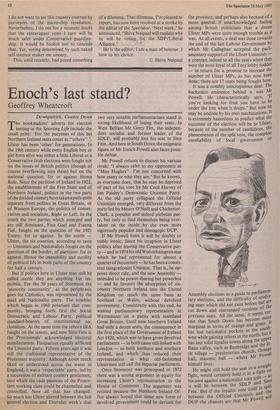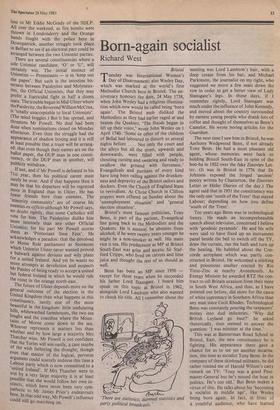Enoch's last stand?
Geoffrey Wheatcroft
Downpatrick, County Down
The bookmakers' adverts for election betting in the Sporting Life include the small print: 'For the purposes of this bet Northern Ireland seats count as "others" '. Ulster has been 'other' for generations. In the 19th century while every English boy or girl born alive was either a little Liberal or a Conservative Irish elections were fought not on the issues of British politics (though of course overflowing into them) but on the national question: for or against Home Rule. Since the partition of Ireland in 1922, the establishment of the Free State and of Northern Ireland, politics in the two parts of the divided country have taken a path quite separate from politics in Great Britain, or of Western Europe, the politics of conser- vatism and socialism, Right or Left. In the south the two parties which emerged and are still dominant, Fine Gael and Fianna Fail, fought on the question of the 1921 Treaty: for or against. In the north Ulster, the six counties, according to taste — Unionists and Nationalists fought on the question of the border, of partition: for or against. Hence the immobility and sterility of political life in both parts of the country for half a century.
But if politics here in Ulster may still be called sterile they are anything but im- mobile. For the 50 years of Stormont the `minority community', as the periphrasis goes for Catholics, was represented by the staid old Nationalist party. The troubles which began in 1968 polarised that com- munity, bringing forth first the Social Democratic and Labour Party, political standard-bearers of constitutional na- tionalism. At the same time the reborn IRA fought on the streets, and now Sinn Fein is the Provisionals' acknowledged electoral manifestation. Fissiparism equally afflicted the Unionist party. Fifteen years ago it was still the traditional representative of the Protestant majority. Although never much liked or understood across the water in England, it was a 'respectable' party, led by a succession of military country gentlemen, into which the rude passions of the Protes- tant working class could be channelled and controlled. Now all that has changed. So much has Ulster altered between the last general election and Thursday week's that two very notable parliamentarians stand in strong likelihood of losing their seats. In West Belfast Mr Gerry Fitt, the indepen- dent socialist and former leader of the SDLP, will probably lose his seat to Sinn Fein. And here in South Down the enigmatic figure of Mr Enoch Powell also faces possi- ble defeat.
Mr Powell refuses to discuss his various rivals: always refer to my opponents as "Miss Hughes". I'm not concerned with how many or who they are.' But he knows, as everyone does, that he may be deprived of part of his vote by Mr Cecil Harvey of Ian Paisley's Democratic Unionist Party. As the old party collapsed the Official Unionists emerged, very different from the party led by Messrs O'Neill and Chichester- Clark, a populist and indeed plebeian par- ty, but only to find themselves being over- taken on the inside by the even more vigorously populist and demagogic DUP.
If Mr Powell loses it will be doubly or trebly ironic. Since his irruption in Ulster politics after leaving the Conservative par- ty and in 1974 his old Wolverhampton seat which he had represented for almost a quarter of the century he has been a consis- tent integrationist Unionist. That is, he op- poses direct rule, and the new Assembly intended to be power-sharing but powerless — and he favours the absorption of six- county Northern Ireland into the United Kingdom on much the same basis as Scotland or Wales, without devolved government. Consistently with this end, he wanted parliamentary representation at Westminster on a parity with mainland Great Britain. Until now Northern Ireland had only a dozen seats, the consequence in the first place of the Government of Ireland Act 1920, which was to have given devolved parliaments — in both cases still linked with London — to both northern and southern Ireland, and which thus reduced their representation in what old-fashioned Ulstermen still call the imperial parliament.
Once Stormont was prorogued in 1972 there was a strong argument in equity for increasing Ulster's representation in the House of Commons. The argument was resisted because the Northern Ireland Of- fice always hoped that some new form of devolved government could be devised for
the province, and perhaps also because of a more general if unacknowledged feeling among British politicians that a dozen Ulster MPs were quite enough trouble as it was. At all events, a deal was done towards the end of the laSt Labour Government by which Mr Callaghan accepted the parli- amentary support of the Ulster Unionists a contrast indeed to all the years when they were the most loyal of all Tory lobby fodder
in return for a promise to increase the number of Ulster MPs, as has now been done; there are 17 seats being fought here.
It was a notably unscrupulous deal. The backstairs eminence behind it was Mr Powell. He characteristically says, `If you're looking for fruit you have to be under the tree when it drops.' But now he may be undone by his own machinations. It is extremely hazardous to predict what the outcome of the election will be in Ulster, because of the number of candidates, the phenomenon of the split vote, the complete unreliability of local government or Assembly elections as a guide to parliamen- tary elections, and the difficulty of analYs- ing seats which did not exist before but are cut down and rearranged versions of the previous seats. All the same, it seems cer- tain that South Down has become more marginal in terms of orange and green. It has lost nationalist pockets in the south- west while gaining others in the north, but it has lost solid loyalist towns along the upper Bann valley, such as Banbridge and the lit- tle village — presbyterian church, Orange hall, masonic hall — where Mr Powell himself lives.
He might still hold the seat in a stra on ight fight, would certainly hold it in a fight his own against a nationalist vote split it will be between the SDLP and Sinn Fein. But if the loyalist vote itself between the Official Unionists and the DUP the chances are that Mr Powell will is split lose to Mr Eddie McGrady of the SDLP. All over the weekend, as fire bombs were thrown in Londonderry and the Orange bands fought with the police here in Downpatrick, another struggle took place in Belfast to see if an electoral pact could be arranged between the two Unionist parties.
There are several constituencies where a sole Unionist candidate, '0' or will certainly win. The initial instinct of Unionists — Protestants — is to `keep out the papes'. But such is the intestine bit- terness between Paisleyites and Molyneux- ites, the Official Unionists, that they may prefer a fratricidal fight in half a dozen seats. The trouble began in Mid-Ulster where the Paisleyite, the Reverend William McCrea, is 'totally unacceptable to local Unionists'. (The mind boggles.) But it has spread, and threatens Mr Powell. No deal had been done when nominations closed on Monday afternoon. Even then the struggle had the appearance of shadow boxing and it is still at least possible that a truce will be arrang- ed: that even though their names are on the ballot paper, the OUP man in one consti- tuency, or the DUP man in another, will publicly withdraw.
If not, and if Mr Powell is defeated in his 71st year, then his political career must surely be over. And if that happens then it may be that his departure will be regretted more in England than in Ulster. He has fewer friends here than enemies. The 'minority community' are of course his enemies ex officio although Mr Powell says, no doubt rightly, that some Catholics will vote for him. The Paisleyites dislike him more intensely than any other Official Unionist; for his part Mr Powell scorns them as 'Protestant Sinn Fein°. He acknowledges a paradox: that the devolved or Home Rule parliament at Stormont which Unionist Ulster never wanted proved a bulwark against devious and wily plans for a united Ireland. And yet he wants no more attempts at devolution and suspects Mr Paisley of being ready to accept a united but federal Ireland in which he would rule the roost in the orange north-east.
The future of Ulster depends more on the general outcome of the election in the United Kingdom than what happens in this constituency, surely one of the most beautiful in the kingdom: little undulating hills, whitewashed farmhouses, the two sea loughs and the coastline where the Moun- tains of Morne come down to the sea. Whoever represents it matters less than whether and by how large a majority Mrs Thatcher wins. Mr Powell is not confident that the Tories will win easily, a case maybe of the wish fathering the thought; though even that master of the logical, perverse argument could scarcely endorse this time a Labour party which is now committed to a `united Ireland'. If Mrs Thatcher were to win by a very large majority it is at least possible that she would follow her own in- stincts, which have never been very sym- pathetic to Mr James Prior's endeavours here. In that odd way, Mr Powell's influence could still go marching on.















































 Previous page
Previous page